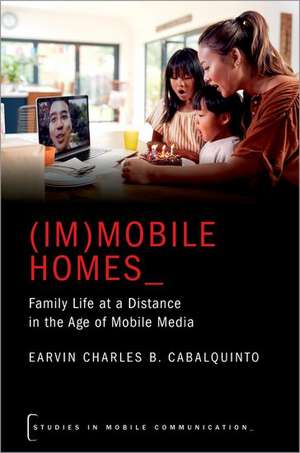(Im)mobile Homes: Family Life at a Distance in the Age of Mobile Media: Studies in Mobile Communication
Autor Earvin Charles B. Cabalquintoen Limba Engleză Paperback – 31 mar 2022
Preț: 228.43 lei
Preț vechi: 243.99 lei
-6% Nou
Puncte Express: 343
Preț estimativ în valută:
43.72€ • 45.47$ • 36.09£
43.72€ • 45.47$ • 36.09£
Carte disponibilă
Livrare economică 12-18 martie
Preluare comenzi: 021 569.72.76
Specificații
ISBN-13: 9780197524848
ISBN-10: 0197524842
Pagini: 256
Ilustrații: 20 figures
Dimensiuni: 226 x 150 x 18 mm
Greutate: 0.36 kg
Editura: Oxford University Press
Colecția OUP USA
Seria Studies in Mobile Communication
Locul publicării:New York, United States
ISBN-10: 0197524842
Pagini: 256
Ilustrații: 20 figures
Dimensiuni: 226 x 150 x 18 mm
Greutate: 0.36 kg
Editura: Oxford University Press
Colecția OUP USA
Seria Studies in Mobile Communication
Locul publicării:New York, United States
Recenzii
This book is an inspiring analysis of the separated condition that millions of migrants and their distant families find themselves in. Earvin Cabalquinto expertly combines digital media, migration, and mobilities research to show us innovative ways of living with loved ones at a distance while also bringing into stark relief conditions and experiences of inequality and colonial path dependencies. A really engaging and interesting read, and highly recommended.
This poignant book chronicles the lives of Filipino transnational migrants and their families who continue to find ways to create a sense of home through mobile communication technologies. Cabalquinto presents an empathetic and nuanced account that highlights not only the creativity and commitment to maintaining connections with family but also the broader structures such as the state and familial expectations that fundamentally shape the possibilities for their (im)mobile homes.
Earvin Cabalquinto paints an insightful and richly detailed picture of how technological mediation enables family life at a distance. This book makes a substantial contribution to the rapidly expanding fields of mobile communication and media and migration research.
Full of resonating stories–from migrant parents torn apart from their children to family grudges that burrowed deep through the cracks of our modern digital communication—this is a powerful book about the everyday struggles of transnational families. Finely observed about the ambivalent possibilities for mediated connection in otherwise impossible situations, Earvin Cabalquinto's ethnography is a must-read for scholars, community organizers, tech designers, and policymakers interested in the well-being of economic migrants.
This poignant book chronicles the lives of Filipino transnational migrants and their families who continue to find ways to create a sense of home through mobile communication technologies. Cabalquinto presents an empathetic and nuanced account that highlights not only the creativity and commitment to maintaining connections with family but also the broader structures such as the state and familial expectations that fundamentally shape the possibilities for their (im)mobile homes.
Earvin Cabalquinto paints an insightful and richly detailed picture of how technological mediation enables family life at a distance. This book makes a substantial contribution to the rapidly expanding fields of mobile communication and media and migration research.
Full of resonating stories–from migrant parents torn apart from their children to family grudges that burrowed deep through the cracks of our modern digital communication—this is a powerful book about the everyday struggles of transnational families. Finely observed about the ambivalent possibilities for mediated connection in otherwise impossible situations, Earvin Cabalquinto's ethnography is a must-read for scholars, community organizers, tech designers, and policymakers interested in the well-being of economic migrants.
Notă biografică
Earvin Charles B. Cabalquinto is Lecturer in the School of Communication and Creative Arts at Deakin University. He is also a member of the Alfred Deakin Institute for Citizenship and Globalization at Deakin University. His research agenda locates the potentialities and paradoxes nestled in the conduct of personal, familial, and social life at a distance via an ecology of mobile technologies and online platforms.








